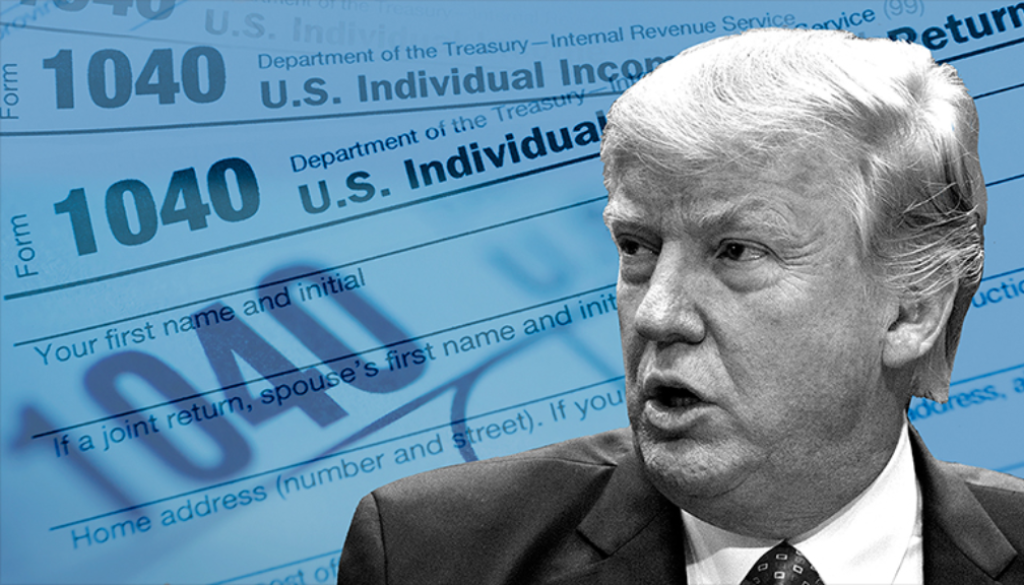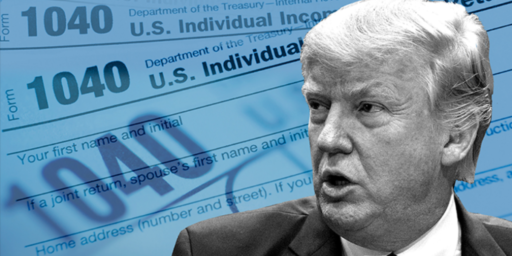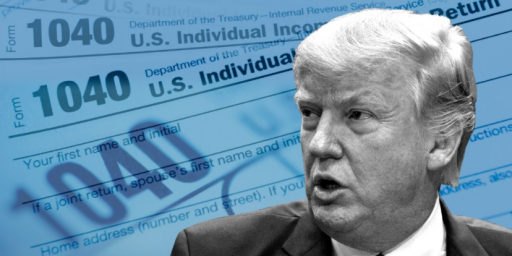House Committee Issues Subpoena For Trump’s Tax Returns
The House Ways and Means Committee voted to issue a subpoena the President's tax returns, but whether it will ever see them is unclear.

The battle between Congress and the White House over obtaining copies of President Trump’s tax returns was raised to a new level yesterday when the House Ways And Means Committee voted to authorize a subpoena directed toward Treasury Secretary Steve Mnuchin and Internal Revenue Service Commissioner Charle Rettig:
WASHINGTON — The chairman of the House Ways and Means Committee subpoenaed the Treasury Department and Internal Revenue Service on Friday, disregarding the Treasury secretary’s refusal this week to hand over six years of President Trump’s personal and business tax returns and demanding access.
The subpoenas from Representative Richard E. Neal, Democrat of Massachusetts, to Treasury Secretary Steven Mnuchin and Charles P. Rettig, the I.R.S. commissioner, amounted to an unexpected shift in tactics in the yearslong Democratic effort to secure tax returns that Mr. Trump has refused to release. Mr. Mnuchin had rejected a request for the returns made under a little-known provision of the federal tax code that dates back to the Teapot Dome scandal of Warren G. Harding’s administration nearly a century ago.
So Mr. Neal is turning to a more conventional avenue: the subpoena.
“After reviewing the options available to me, and upon the advice of counsel, I issued a subpoena today to the secretary of the Treasury and the commissioner of the I.R.S. for six years of personal and business returns,” Mr. Neal said in a statement. “While I do not take this step lightly, I believe this action gives us the best opportunity to succeed and obtain the requested material.”
The new approach is unlikely to be any more fruitful in the short term, given Mr. Trump’s vow to fight all subpoenas from House Democrats. Subpoenas are now pending from the Ways and Means, Judiciary, Oversight and Reform, Financial Services and the Intelligence Committees.
But like those other broiling disputes between the legislative and executive branches, the fight over Mr. Trump’s tax returns could soon head to the federal courts, and House lawyers believe they have a better and speedier case defending a subpoena than a legally untested tax code provision.
Mr. Neal gave the agencies until 5 p.m. May 17 to produce the records, and is expected to go to court to enforce his request shortly thereafter if the Trump administration continues to argue that the committee does not have a legitimate legislative purpose that warrants compliance.
The subpoena requests six years of Mr. Trump’s personal tax returns as well as returns for eight other entities that represent the core of his business empire from 2013 to 2018. It also demands any related paperwork but, unlike the earlier request, does not seek information on potential audits conducted in those years.
The Treasury Department and the I.R.S. did not immediately comment on the subpoenas. Even if they were to comply, it is unlikely the tax information would become public anytime soon given legal concerns about taxpayer privacy.
Mr. Neal had been weighing whether to file a lawsuit immediately to try to enforce the century-old tax code provision he relied on initially or to shift course and issue a subpoena to compel production of the returns.
His initial invocation of the tax code provision — Section 6103 — was novel and set off a flurry of legal scholarship. The section gives the chairmen of Congress’s tax-writing committees unique powers to request information on any taxpayer from the I.R.S. and says only that the executive branch “shall” furnish the material upon request. The House Ways and Means Committee and Senate Finance Committee routinely use this method to study the effects of tax policy on real taxpayers, but there is scant precedent for using it to study a president’s tax information — a fact that Republicans seized on to oppose the effort.
Ultimately, Democrats decided it posed too many risks to bring directly to court.
All of this, of course, comes on the wake of the decision of Treasury Secretary Mnuchin to decline to comply with Chairman Neal’s request for copies of the President’s tax returns. That request was made a section of the U.S. Code that allows the heads of the two tax committees in the House and Senate to request copies of the tax returns of any individual. Subsequent Supreme Court decisions on Congressional investigations generally, though. have made clear that those requests have to have some “legitimate legislative purpose.” In his letter to Congress, Mnuchin focused on the idea that the alleged purpose that Chairman Neal had cited in his original request was not, according to the Justice Department, sufficient under the statute and existing case law. As I stated at the time, whether that objection has merit is something that will require a court to determine.
In theory, the Ways and Means Committee could have chosen to simply file a lawsuit against Mnuchin over his refusal to turn over the returns based solely on the relevant statute. Going the subpoena route, though, strengthens what is likely to be an inevitable legal argument in that it’s far more serious for a Cabinet official to defy a subpoena than to simply turn down a request made on a statute. That being said, it’s likely that Mnuchin and Riggle will respond to the subpoena in the same manner that Mnuchin responded to Chairman Neal’s previous request, which means that this matter will ultimately be headed to the courts to decide and that it may ultimately have to be decided by the Supreme Court. At this rate, though, it’s entirely possible that the case and any related appeals could take so long that Donald Trump may no longer be President.



You keep saying this, but I can’t figure out why you think it’s true. The Supreme Court decisions you cite are about compelled testimony by individuals, not about rendering of records from the Executive Branch to the Legislative Branch, or about limits on the duty of the Executive to comply with section 6103 of the Internal Revenue Code.
Congress cannot compel Trump to testify about his tax returns unless they have a legitimate legislative purpose in doing so.* This has nothing to do with Congress’s clear legal authority to get Trump’s tax returns from the Treasury and view them in closed session.
*Such as, say, wondering if there might be something there that explains his consistent deference to Vladimir Putin…
@DrDaveT:
I say it because jt has become accepted and settled law.”
In any case, as I have said repeatedly, this matter will obviously end up before the courts so we’ll get an answer at some point.